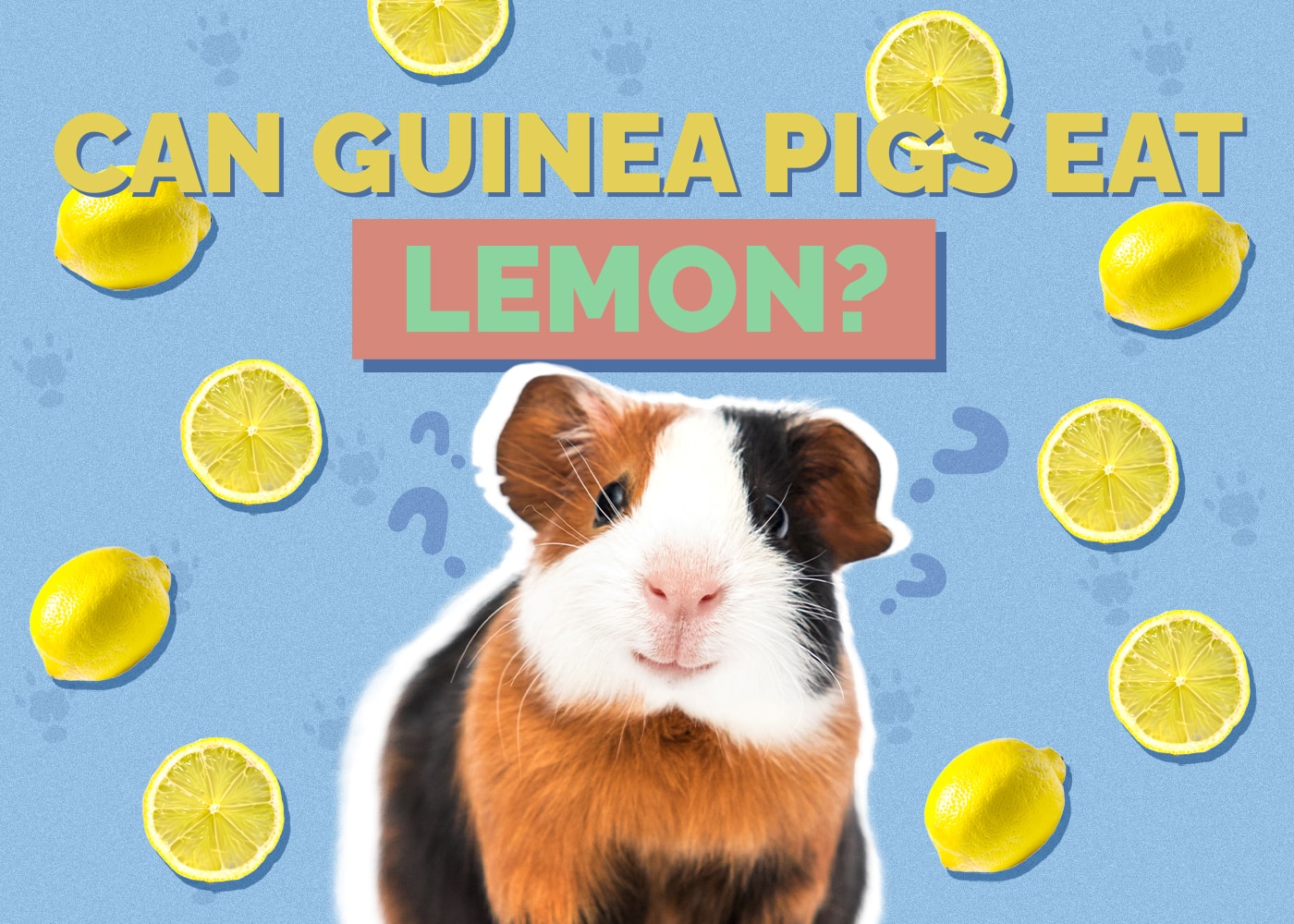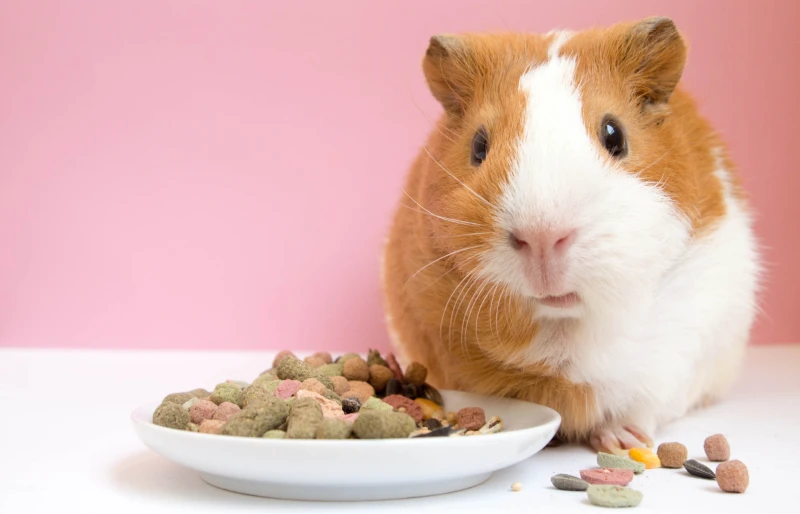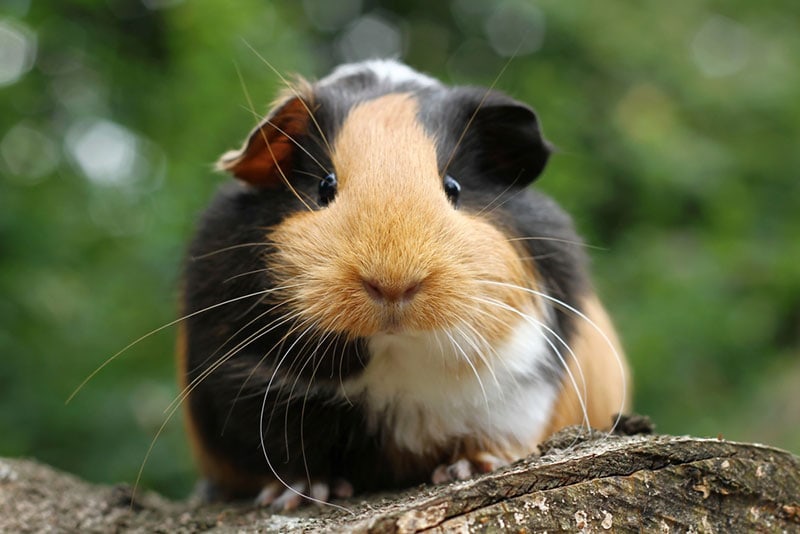Can Guinea Pigs Eat Lemon? Vet Approved Nutrition Facts & FAQ
Updated on

Click to Skip Ahead
Most people know that guinea pigs are herbivores that enjoy hay, pellets, and fresh green plant matter in general, but beyond that, it gets a little fuzzy. For instance, what about tart, crisp lemons? We use them in our beverages, pastries, and other goodies, and it might seem logical that a guinea pig wouldn’t turn their nose up at a small wedge of fresh lemon.
Guinea pigs can technically eat lemon, as it isn’t toxic to them, but it’s too acidic to be a regular part of a guinea pig’s diet. A lemon’s high acid content can cause digestive upset as well as irritating sores in your guinea pig’s mouth, throat and even stomach. A small nibble shouldn’t hurt, but giving them a larger piece or giving lemon frequently can create problems.
If you’re interested in whether guinea pigs can eat other types of citrus fruit, what they’re supposed to eat, and what to use as a treat instead of lemon, we’ve got you covered. Join us down below as we go into the details.
Does Lemon Have Health Benefits for Guinea Pigs?
We already know guinea pigs can technically sample a bit of lemon flesh but that it’s not ideal, but what about its nutritional content? Does it offer them anything besides an upset stomach? Yes, surprisingly! Lemon contains some powerful nutrients that guinea pigs can take advantage of. Let’s briefly cover some of those health benefits below.
- Vitamin C: Like us, guinea pigs need a steady supply of vitamin C in their diet since they can’t make their own. Lemons do provide some vitamin C, but they shouldn’t be your pig’s only source. It would take about one whole lemon to provide the daily requirement of vitamin C.
- Fiber: Lemons have a moderate amount of fiber, which helps your guinea pig’s digestive system run like clockwork.
- Antioxidants: The antioxidants in lemon can contribute to a healthy immune system, prevention of diseases, and protect cells from damage.
Risks of Guinea Pigs Eating Citrus
All of those benefits of lemons listed above are usually outweighed by the potential risks. In order to achieve the most from these benefits, a guinea pig would need to eat a significant amount of lemon, which could potentially lead to any of these issues.
- Digestive issues: A lemon’s acidity wreaks havoc on a guinea pig’s sensitive stomach and makes it a poor fruit choice for a treat.
- Mouth sores: A bit ironic considering that vitamin C helps prevent mouth sores from scurvy, but the citric acid in lemon is very irritating to a guinea’s delicate mouth tissues and gums.
- Dental issues: Last but certainly not least, citric acid is very bad for their teeth as well and may contribute to enamel erosion and, with time, tooth decay.
Are There Any Citrus OK for Guinea Pigs to Eat?
Yes, but definitely in very limited quantities. All citrus fruits are fairly acidic and you should only feed a tiny morsel to your guinea pig as a treat. Ideally, you would find other treats that are more suitable for their delicate digestive systems because too much citrus in their diet can cause the same adverse health effects detailed just above.
Other citrus fruits like oranges, grapefruits and limes are like lemons in that they’re also technically edible for guinea pigs but not a great idea. The risks are simply too high, and you’re better off finding more appropriate treats that won’t upset their tummies.

What Fruits Can Guinea Pigs Eat?
You likely think of fruits as healthy, and they are in moderation. When serving fruit to a guinea pig, you have to consider their size. They shouldn’t chow down on a whole orange at a time, for instance. Start with a small slice of fruit and observe how your guinea pig tolerates it before thinking about making it a regular thing. By a regular thing, it means any fruits should only be given a few times a week, along with fresh vegetables. Check out some of the fruits you can offer your guinea pig just below.
- Apples: Relatively low in sugars, apples are a favorite of guineas and are loaded with vitamins B and C, as well as dietary fiber. Remove the seeds before serving.
- Bananas: Rich in potassium and vitamin C, bananas are a safe fruit for guinea pigs to eat but only in small servings because of its high sugar content.
- Blueberries: A natural choice because of their small size and juicy flavor, blueberries are high in beneficial fiber and vitamins.
Wrapping Up
Guinea pigs aren’t picky eaters and might taste a little bit of lemon, but it is far too acidic to be a regular part of their diet and can even cause digestive or mouth problems. Instead of lemon, you can try a bit of apple or blueberry to treat your guinea pig.
Featured Photo Credit: MiraCosic, Pixabay












